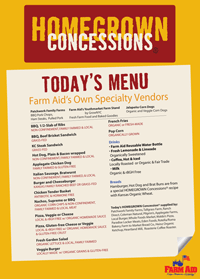 At Farm Aid, I know the HOMEGROWN Concessions® (yes, earlier this year we had it trademarked) will give me lots of options for finding tasty food grown by family farmers. A huge amount of work by countless people goes into getting all that food ready for concert day, but one key person is the concert’s Culinary Director Sonya Dagovitz. I spoke with Sonya about this year’s concert in Kansas City to find out how those family farm-sourced bratwursts, BBQ pork chops, and veggie burgers filled so many happy concertgoers’ bellies.
At Farm Aid, I know the HOMEGROWN Concessions® (yes, earlier this year we had it trademarked) will give me lots of options for finding tasty food grown by family farmers. A huge amount of work by countless people goes into getting all that food ready for concert day, but one key person is the concert’s Culinary Director Sonya Dagovitz. I spoke with Sonya about this year’s concert in Kansas City to find out how those family farm-sourced bratwursts, BBQ pork chops, and veggie burgers filled so many happy concertgoers’ bellies.Sonya (who is also President of Natural Needs, specializing in sustainable foodservice, event marketing, fundraising, and consumer outreach & education) has worked around the concert with Farm Aid since 1997. Initially, she made sure the food served backstage for artists and production staff is sourced from family farmers, identified as local, and/or organic, non-GMO, humanly raised, or utilizing other ecological practices, along with a commitment to a fair price for producers.
Farm Aid’s commitment to promoting food from family farms for years has included a wide range of activities, but one crucial aspect we needed to figure out was how to serve family farm food to the thousands who attend the concert. For many years Farm Aid included a few family farm vendors in concession, particularly Patchwork Family Farms. But by 2006 Farm Aid began to transition the venues’ concessionaires themselves.
And the dream we shared (as Sonya put it, “Wouldn’t it be so wonderful if all the people at the concert could have this food?”) became a more complete reality in 2007 in New York. Farm Aid called it HOMEGROWN Concessions and made it a required deal point in the venue contract. Since then, everyone at the show, whether they’re sitting in the back row or are hanging out backstage with Willie, can get a taste of that good food.
Farm Aid’s first step is meeting with the people who provide food service at the venue to talk about our mission. We discuss the criteria that are used to define “good food,” why Farm Aid cares about where the food comes from and how it’s produced. The concessionaire generally uses their already created menu, while adding a few more fresh items. Then it’s Sonya’s job to go out and find family farmer sources that can supply that menu. She says, “They have professional kitchens, and they think more in terms of food service and portion control with set recipes. They’re very precise in how they cook, whereas our food may be less precise in terms of recipe, but more precise in terms of the growing practices for the ingredients themselves.”
Sonya looks at each venue’s existing distributors and sees if they have good options that we could use. She explains, “Is there anything there that the distributors can already get? Because if their food service provider is carrying good food and now the venue starts buying it — then that’s good! It’s good for business, and it sends a message to those distribution channels that there really is a market for family farm food.”
In addition, Farm Aid’s long-time relationships with farm groups in the local communities is a resource for sourcing family farm food. Sonya describes the process this way, “Let’s say they have a corn roast on the menu. Who’s got corn? Who are the farmers growing corn in this area? Or if it’s burgers, who are the ranchers here? Who’s grass-fed and who can we purchase from? That’s a sale for a local area farmer. At Farm Aid, we’re all about growing local economies and the concert itself does that with its food services. It provides some really good orders for some people — co-ops, local markets, CSAs — everyone just rallies around the food services. It’s a lot of work, but we leave behind a lot of relationships that last after the concert is over.”
In addition, Farm Aid brings along three subvendors to round things out. Farm Aid’s Youthmarket Farm Stand is organized by Tom Strumolo and Olivia Blanchflower of GrowNYC. They create a gorgeous farmers market of fruit and produce and employ local youth to help run it. Patchwork Family Farms of Missouri brings their pork products and Jalapeno Corndog Concessions serves up—you guessed it—corn dogs!
It’s a challenge bridging so many gaps and getting over resistance to change and making so many modifications to the menu for a one-day show. I asked Sonya how she approaches that and she said, “When you’re discussing food, it’s very cultural, it’s very personal. You can’t go in there and say, ‘You’re doing something wrong.’ You want to come from a place of positive hope for better health — personal health, planetary health.”
Sonya was especially proud of a few items you may have tasted in Kansas City this year. The buns for all the hot dogs and hamburgers used flour from organic Kansas wheat. The baker re-formulated his recipes to take out preservatives, added in the special wheat, and ended up really happy with the new product. Sonya was happy too, saying “It’s a great example of how a bakery, that’s been there a long time and makes a huge volume of buns and rolls, has now ordered flour from a Kansas mill that they’d never talked to before. Now you’ve created a new market and now maybe there’s a new relationship that wasn’t there before.”
 Sonya was also thrilled with the hamburgers (from local grass-fed cattle) and the pizzas. There were no frozen pizzas shipped across the country for our Farm Aid fans! Homemade dough, pizza sauce made at the venue from organic tomatoes, local roasted vegetables on top — even a gluten-free option.
Sonya was also thrilled with the hamburgers (from local grass-fed cattle) and the pizzas. There were no frozen pizzas shipped across the country for our Farm Aid fans! Homemade dough, pizza sauce made at the venue from organic tomatoes, local roasted vegetables on top — even a gluten-free option.
Reducing trash is also a huge goal at Farm Aid through composting and recycling. Farm Aid friends Anne and Derek Bedarf spearhead the effort. Sonya also works with the concessionaire to reduce trash before it’s even created. She added a garden salad to the menu and had the dressing made in bulk right at the venue, removing the need for thousands of little packets of dressing that would be thrown away. Backstage, she also cut way down on soda bottles and cans this year, with pitchers of tasty fresh iced tea and lemonade served in compostable cups. In fact, every plate, cup, bowl, fork, knife and spoon was made from compostable materials. And all of that foodservice compost creates new, healthy soil for growing good food! This year Missouri Organic donated composting containers and hauled it away.
Farm Aid is a unique concert, but hopefully the idea of good food at venues will spread. Sonya says, “Life has gotten so complicated that we don’t even see what’s simple anymore. French fries don’t come off the food service truck in a bag. French fries come from the Earth. You cut potatoes up and you fry them! There’s a disconnect with where food came from with the people who are making the food. This is the challenge, and we’re going to fix it one venue at a time.”
I sure hope the idea of good food at concerts spreads, for my own sake and for the new opportunities it presents chefs, food distributors and family farmers.
Take a look behind the scenes and around the LIVESTRONG Sporting Park looking at the HOMEGROWN Concessions in this slideshow of photos taken by Cathy McDermott-Tingle.
Further Reading
- On our blog, Jennifer posted her impressions of the food at Farm Aid 2011. Judging by the title, “Farm Aid sure is tasty!” you can probably guess she didn’t go hungry.
- Check out HOMEGROWN.org (Farm Aid’s online community of people interested in all things HOMEGROWN: growing, cooking, crafting, preserving, building, making and creating) and take a look at the “Homegrown Cookin!” group to learn more about how to use fresh ingredients, whether you bought them at the farmers market or grew them in your backyard.

